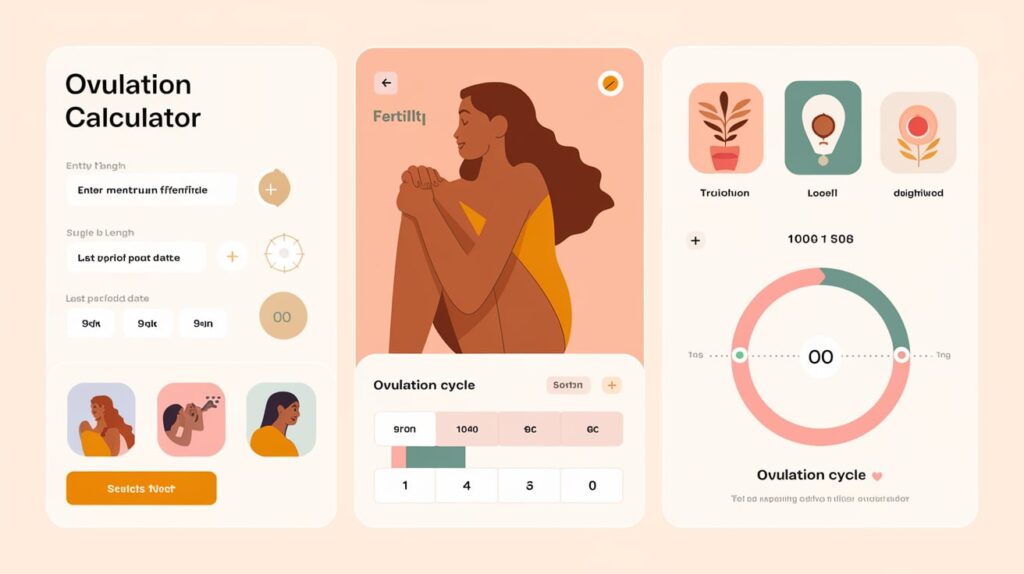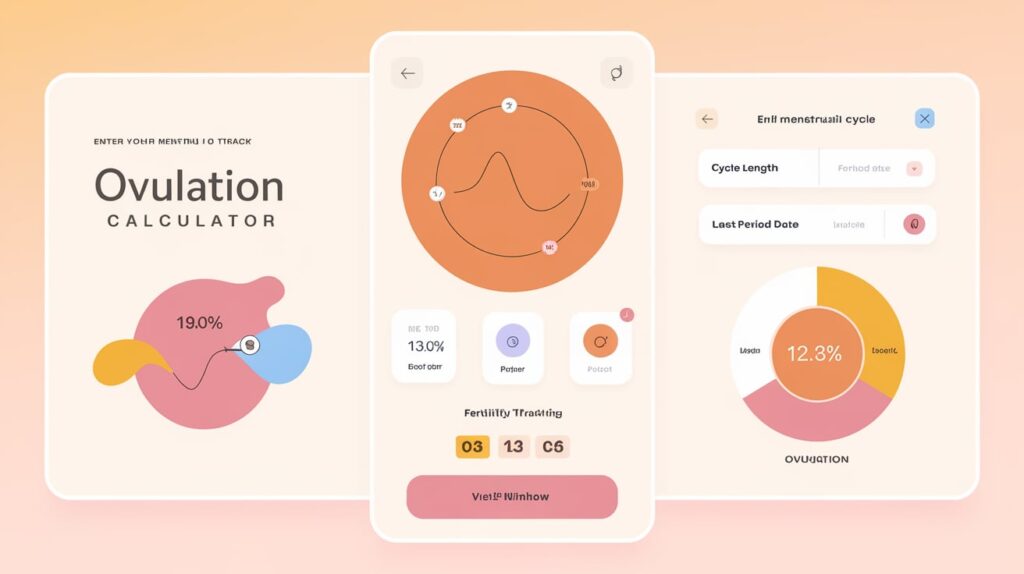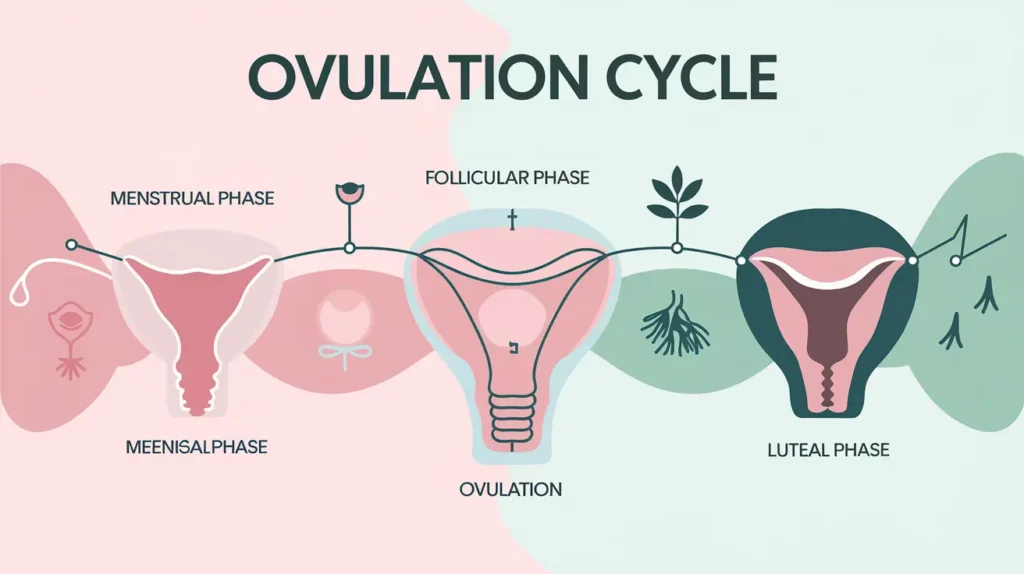
Ovulation Calculator
Symptom Tracker
Fertility Tips
Cycle History

Comprehensive Guide to menstruation period calculator, Ovulation Calculators and Fertility Tracking
Understanding your ovulation cycle / menstrual cycle is crucial for anyone trying to conceive. menstruation period calculators provide a valuable tool to estimate your most fertile days, helping you plan intercourse effectively. This guide explores the science behind ovulation, how to use calculators, and additional methods to enhance fertility awareness.
What is Ovulation?
Ovulation is the release of a mature egg from the ovary, typically occurring 12 to 16 days before the start of the next menstrual period. This period marks the peak of fertility, with a fertile window lasting about 6 days—the five days leading up to ovulation and the day of ovulation itself.
Key Statistics of menstruation period
- Average Menstrual Cycle: 21 to 35 days, with 28 days being the most common.
- Fertile Window: Approximately 6 days, with sperm capable of surviving up to 5 days in the female reproductive tract.
How to Use Our Ovulation Calculator
To effectively use an menstruation period calculator or ovulation calculator, follow these steps:
- Enter the First Day of Your Last Period: This date is essential for calculating your cycle length.
- Select Your Average Cycle Length: Most calculators allow you to choose from typical cycle lengths (21-35 days).
- Calculate Your Ovulation Date: The calculator will provide an estimated ovulation date and fertile window.
Example Calculation
| Cycle Length | Estimated Ovulation Day | Fertile Window |
|---|---|---|
| 21 Days | Day 7 | Day 2 to Day 7 |
| 28 Days | Day 14 | Day 9 to Day 14 |
| 35 Days | Day 21 | Day 16 to Day 21 |
Signs of Ovulation / menstruation

Recognizing when you are ovulating can further increase your chances of conception. Common signs include:
- Cervical Mucus Changes: Becomes clear and stretchy, resembling egg whites.
- Basal Body Temperature Rise: A slight increase (0.5°F) indicates that ovulation has occurred.
- Physical Symptoms: Mild pelvic pain (mittelschmerz) or heightened libido.
Additional Indicators for menstruation period
- Breast Tenderness: Hormonal fluctuations may cause sensitivity.
- Mood Swings: Changes in hormone levels can affect emotional states.
- Increased Sense of Smell: Some women report heightened olfactory sensitivity during ovulation.
Benefits of Using an Ovulation Calculator | menstruation period calculator
Using an ovulation calculator offers several advantages:
- Convenience: Easily track your cycle and predict ovulation using online tools or apps.
- Family Planning: Helps couples plan intimate moments during fertile days, maximizing chances for conception.
- Predicting Fertile Windows: Identifies optimal times for intercourse based on average cycle data.
Top Benefits Overview
| Benefit | Description |
|---|---|
| Convenience | Accessible tools for easy cycle monitoring |
| Family Planning | Helps couples plan intimate moments |
| Predicting Fertile Windows | Increases chances of conception by identifying fertile days |
How Accurate Are Menstruation Period Calculators?
While ovulation calculators and menstruation period calculator provide useful estimates, their accuracy can vary significantly:
- Nearly 52% of menstrual cycles vary by 5 or more days, making it challenging to predict ovulation accurately using average data alone 2.
- Clearblue Digital Ovulation Tests boast over 99% accuracy in detecting the LH surge that occurs just before ovulation 3. These tests are more reliable than calendar methods and can help identify peak fertility days.
Frequently Asked Questions
When Did I Ovulate?
To estimate when you ovulated:
- Subtract 14 days from your next expected period if you have a regular cycle.
- For irregular cycles, monitor symptoms or use ovulation tests for better accuracy.
What is a Fertility Calculator and menstruation period calculator?
A fertility calculator helps estimate your most fertile days based on your menstrual cycle information, allowing you to identify optimal times for conception.
Can Stress Affect Ovulation?
Yes, stress can disrupt hormonal balance and impact ovulation timing. Managing stress through relaxation techniques like yoga or meditation may help regulate cycles.
How Can I Increase My Chances of Conception?
- Regular Intercourse: Aim for every other day during your fertile window.
- Track Your Cycle: Use apps or journals for monitoring menstrual cycles and symptoms.
- Consider Ovulation Tests: These can provide more precise predictions by detecting hormonal changes.
Common Myths About Ovulation
- Menstrual Cycles Are Always 28 Days Long: The average cycle is indeed around 28 days, but individual cycles can vary widely.
- You Can Only Get Pregnant on the Day of Ovulation: Sperm can survive for several days; thus, having intercourse in the days leading up to ovulation increases chances of conception.
- All Women Experience Ovulatory Symptoms: Not all women notice physical signs; some may have subtle changes that go unnoticed.
How Do I Know If I’m Ovulating?
To determine if you are ovulating, pay attention to your body’s signs. Many women experience changes in cervical mucus, which becomes clear and stretchy, resembling egg whites, during ovulation. Additionally, you may notice a slight increase in basal body temperature (typically around 0.5°F) after ovulation occurs. Other signs can include mild pelvic pain known as mittelschmerz, breast tenderness, and heightened libido. Tracking these symptoms over a few cycles can help you identify your ovulation pattern more accurately.
What Should I Do If My Cycle Is Irregular?
If you have irregular cycles, predicting ovulation can be more challenging. In such cases, consider using ovulation predictor kits (OPKs) that detect the surge in luteinizing hormone (LH) that occurs just before ovulation. Additionally, tracking your cycle using a fertility app can help identify patterns over time, even if they vary month to month. Consulting with a healthcare provider is also advisable to rule out any underlying conditions that may be affecting your cycle.
Can I Still Get Pregnant If I Have Irregular Cycles?
Yes, it is still possible to conceive with irregular cycles. Many women with irregular periods successfully become pregnant. The key is to monitor your cycle and identify your fertile window using methods such as tracking basal body temperature, observing changes in cervical mucus, or using ovulation tests. Understanding your unique cycle can help you pinpoint the best times for conception.
How Long Does Sperm Live Inside the Female Body?
According to a post by Cleveland clinic, Sperm can survive inside the female reproductive tract for up to 5 days under optimal conditions. This means that having intercourse a few days before ovulation can still result in pregnancy, as sperm may be present when the egg is released. This longevity highlights the importance of timing and planning around the fertile window for couples trying to conceive.
Are There Any Lifestyle Changes That Can Improve Fertility?
Yes, several lifestyle changes can enhance fertility for both men and women. Maintaining a healthy weight is crucial, as being underweight or overweight can disrupt hormonal balance and affect ovulation. A balanced diet rich in fruits, vegetables, whole grains, and lean proteins supports overall health and reproductive function. Regular exercise can also improve fertility but should be balanced to avoid excessive training. Additionally, reducing alcohol and caffeine intake and managing stress through relaxation techniques like yoga or meditation can positively impact fertility.
What Are the Most Common Causes of Infertility?
Infertility can result from various factors affecting either partner. In women, common causes include hormonal imbalances (such as polycystic ovary syndrome), age-related decline in egg quality, blocked fallopian tubes due to infections or endometriosis, and uterine abnormalities.
For men, infertility may stem from low sperm count or motility issues, hormonal imbalances, or structural problems in the reproductive system. Lifestyle factors such as smoking, excessive alcohol consumption, and obesity can also contribute to infertility in both men and women.
When Should I Seek Help from a Fertility Specialist?
If you have been trying to conceive for over 12 months without success (or 6 months if you are over 35), it may be time to consult a fertility specialist. Early evaluation can help identify any underlying issues and provide appropriate treatment options tailored to your needs.
Additionally, if you have known reproductive health issues or irregular cycles that complicate conception efforts, seeking professional guidance sooner rather than later is advisable.
How Accurate Are Ovulation Calculators?
The accuracy of ovulation calculators varies significantly based on individual cycle characteristics. Research indicates that while many apps provide estimates based on average cycle lengths, they may only achieve an accuracy rate of about 21% when predicting specific ovulation days
In contrast, methods like Clearblue Digital Ovulation Tests boast over 99% accuracy in detecting the LH surge that occurs just before ovulation 23. This highlights the importance of combining different methods for more reliable predictions.
Can an Ovulation Calculator Help with Birth Control?
Using an ovulation calculator as a method of birth control is not recommended due to its inherent inaccuracies. While some women attempt to track their fertile days to avoid pregnancy, variations in menstrual cycles can lead to unintended pregnancies. It is safer to use more reliable contraceptive methods if pregnancy is not desired
What Is the Best Time of Day to Take an Ovulation Test?
For optimal results with an ovulation test, it is generally recommended to test in the afternoon or early evening when hormone levels are often at their peak after being concentrated in urine throughout the day. Avoid testing first thing in the morning since LH levels may not be as high at that time
Is a Positive Ovulation Test a Good Sign?
A positive result on an ovulation test indicates that there has been a surge in luteinizing hormone (LH), signaling that ovulation is likely to occur within the next 24-36 hours. This is an excellent time for couples trying to conceive to engage in intercourse since it marks their most fertile period.
for more health resources checkout our health category.
Reference
- CDC National ART Surveillance: This page provides information about the National ART Surveillance System, which collects data from fertility clinics in the U.S. to calculate success rates and monitor trends in assisted reproductive technology (ART).
CDC National ART Surveillance 1 - MedlinePlus – Infertility: The National Library of Medicine’s MedlinePlus offers comprehensive information on infertility, including causes, treatments, and resources for care and support.
MedlinePlus – Infertility - RESOLVE: The National Infertility Association: This non-profit organization provides resources and support for individuals facing infertility, including educational materials about ovulation and fertility tracking.
RESOLVE - Wikipedia – Ovulation: This Wikipedia entry covers the biological process of ovulation, its role in the menstrual cycle, and its importance in reproduction.
Wikipedia – Ovulation - ClinicalTrials.gov: A registry of federally and privately supported clinical trials conducted around the world, including studies related to infertility and reproductive health.
ClinicalTrials.gov




